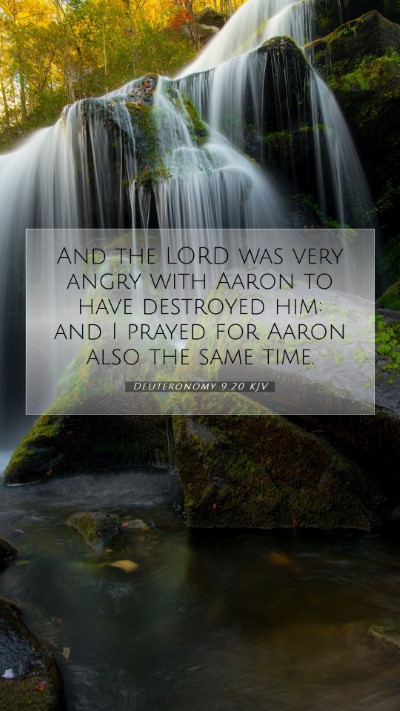Bible Verse Meaning: Deuteronomy 9:20
Verse: "And the LORD was very angry with Aaron to have destroyed him: and I prayed for Aaron also the same time." (Deuteronomy 9:20)
Introduction
This verse illustrates a moment of intense intercession by Moses on behalf of Aaron. It captures not only the severity of God's anger but also the profound compassion and mediating role of Moses. To fully grasp the meanings of this verse, we can gather insights from esteemed public domain commentaries, providing a robust understanding of its implications in the broader biblical narrative.
Bible Verse Commentary and Interpretations
Understanding the Context
According to Matthew Henry's Commentary, the context of this verse falls within a narrative where Moses recounts the people's rebellion and idolatry, especially focusing on the sin of making the golden calf. The strong emotions displayed by God towards Aaron signify the seriousness of idolatry and the consequences of leading others astray. Henry stresses that Moses’ intercession was vital to prevent Aaron's destruction.
Albert Barnes further elaborates that this anger indicates the Lord's righteous indignation toward sin, particularly when it affects His chosen leaders. Barnes notes that the phrase “I prayed for Aaron” highlights Moses’ role as an intercessor, which is a common theme throughout the scripture. This reflects the compassionate heart of Moses, demonstrating that he cared deeply for his brother and for the people, despite their failings.
Adam Clarke adds that Moses's prayer was not just an act of desperation but a reflection of his leadership. Clarke indicates that leadership often involves taking responsibility for the sins of others and seeking reconciliation with God on their behalf. Aaron, being the high priest, represented the people, and his downfall would have catastrophic implications for Israel's spiritual health.
Theological Implications
This verse sheds light on the nature of God as one who expresses anger towards sin while also allowing room for mercy through intercession. The act of Moses praying for Aaron suggests that while God is just and punishes sin, He also hears the prayers of those who plead for mercy. Such themes are echoed in many Bible verses, displaying God's dual character of justice and mercy.
Application of the Verse
The application of Deuteronomy 9:20 to modern life offers rich opportunities for personal reflection and group discussion. Here are some key takeaways:
- Power of Intercession: Like Moses, individuals can take an active role in praying for others, particularly those in leadership who may fall into temptation.
- Understanding God's Anger: Recognizing that God’s anger results from love for righteousness can prompt believers to evaluate their own lives and communities.
- Responsibility in Leadership: Leaders must be aware of their significant influence on others, illustrating the need for accountability and integrity.
- Seeking Reconciliation: The willingness to pray and seek mercy for others reflects a heart aligned with God's desires for love and forgiveness.
Cross References
Several other Bible verses echo themes central to Deuteronomy 9:20:
- Exodus 32:11-14: Moses intercedes for Israel following the golden calf incident, displaying God’s mercy.
- Numbers 14:19-20: Moses pleads for the people’s forgiveness, and God relents from destroying them.
- Jeremiah 7:16: God instructs Jeremiah not to pray for the people who have turned away, emphasizing the seriousness of their rebellion.
Conclusion
In summary, Deuteronomy 9:20 serves as a profound reminder of the gravity of sin, the role of intercession, and the character of God concerning justice and mercy. Through studying this verse, individuals can gain valuable Bible study insights and enhance their understanding of Scripture. By employing Bible study tools and Bible study resources, believers can further explore these themes and their implications in their lives and communities.
This exploration not only enriches personal faith but can also serve to inform discussion in Bible study groups, fostering a deeper appreciation for God’s holy standards and the importance of prayer in overcoming the challenges faced by believers today.


